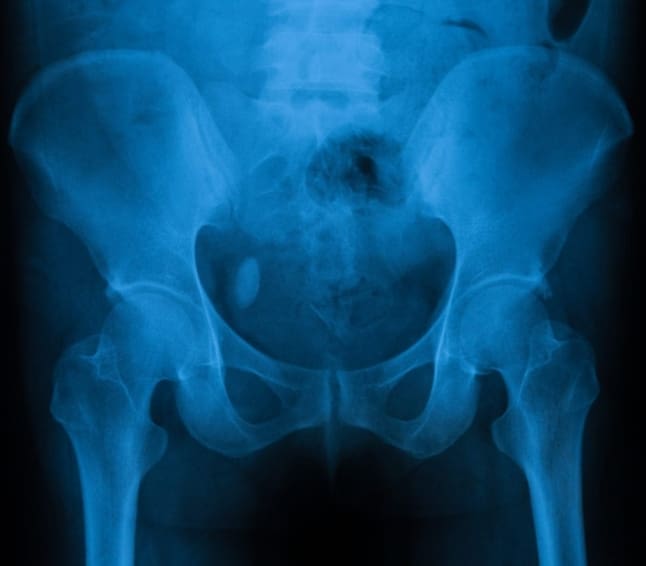
Related Topics
What are bladder stones?
Bladder stones are small crystals that form in your urine. They are hard and become trapped in your bladder. Bladder stones comes in all shapes and sizes. They are more common in men.
Symptoms of bladder stones
Symptoms include the following:
- Stomach pain or pressure
- Cloudy or dark-colored urine
- Blood in your urine
- Frequent or painful urination
- Trouble passing urine, start and stop of the urine stream, loss of urine control
- Pain in your penis
- Signs of a urinary tract infection (UTI), which may include fever, pain when urinating, urgency and frequent urination
Not everyone has symptoms. Symptoms are triggered by the movement of the stones. Another trigger is when the stones block the urine from leaving the bladder.
What causes bladder stones?
Bladder stones are formed by minerals in your urine. Common problems that lead to bladder stones include:
- Enlarged prostate
- Blockage at the base of the bladder
- Bladder diverticulum (the bladder lining pokes through a weak part in the bladder wall)
- A urinary tract infection
- Radiation to your pelvis
- Nerve damage
- Bladder surgery
- Cystocele (when a woman’s bladder wall weakens, drops and creates pressure in the pelvic area)
- Not emptying your bladder all the way
Acidic urine can cause bladder stones. Overly concentrated urine can cause bladder stones. A foreign object in your bladder can cause bladder stones.
Kidney stones are not the same as bladder stones. Kidney stones don’t always go away on their own. If they get stuck in the bladder, they can produce new stones.
How are bladder stones diagnosed?
If you have symptoms, see your doctor. Your doctor will do a physical exam. They will press on your stomach to see if you are in pain. For men, your doctor may do a rectal exam to check your prostate. Additional tests include:
- A urine test (using a sterile wipe to avoid bacteria)
- Pelvic imaging (CT scan, X-ray, ultrasound)
- Urinary tract imaging (CT scan), which might include a special dye injected into your veins to highlights the stones
- Cystoscopy (inserting a small, flexible tube attached to a camera into your urethra, where urine passes.)
Can bladder stones be prevented or avoided?
Several factors can help prevent or avoid bladder stones. These include:
- Treat a UTI early.
- See your doctor about other medical conditions that cause bladder stones.
- Stay healthy. Drink plenty of water. Avoid food high in fat, salt, and sugar.
- Avoid smoking.
- Avoid illegal drugs.
- Don’t wait to see your doctor when you notice symptoms.
Bladder stones treatment
Some bladder stones (small ones) pass on their own. This happens as you urinate. There may be some pain as they pass. Drink at least 6 to 8 glasses of water each day to increase urination. In most cases, your doctor will need to remove them. The most common way is to use a cystoscope. Your doctor will insert a small tube attached to a camera into your urethra. The camera detects the stones. Your doctor uses a laser or ultrasound to break the stones into smaller sizes. Fluids will wash out the remaining pieces. If stones are too large, surgery may be necessary. Your doctor will cut an opening near your pelvis to remove the stones. Surgery requires some form of anesthesia. You might have to stay in a hospital.
Living with bladder stones
After surgery, your doctor will check to make sure all stones are gone. They may repeat tests to confirm. Your doctor also might prescribe medicine to prevent infection.
Your doctor may need to treat the cause of your bladder stones. For example, if your doctor finds a tumor in your bladder, they will check for cancer. The current clinical recommendation from the American Academy of Family Physicians (AAFP) does not include routine preventive screening for bladder cancer. Left untreated, bladder stones can cause lasting damage. This includes repeat UTIs or injury to your bladder, kidney, or urethra.
Questions to ask your doctor
- How can I tell the difference between bladder stones and kidney stones?
- Are bladder stones a risk factor for bladder cancer?
- Can I treat of the pain of bladder stones with over-the-counter medicine?
- If I have bladder stones once, am I more likely to get them again?
- Are bladder stones hereditary?
- Are bladder stones more difficult for pregnant people?
![]()
Copyright © American Academy of Family Physicians
This information provides a general overview and may not apply to everyone. Talk to your family doctor to find out if this information applies to you and to get more information on this subject.









